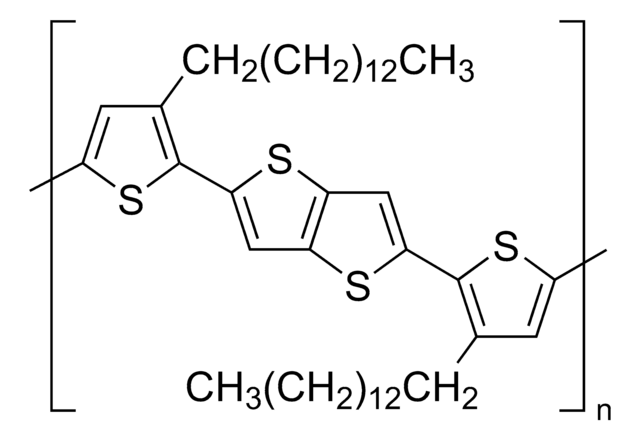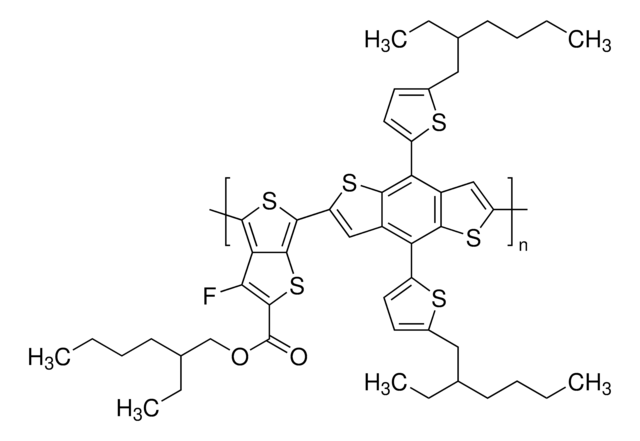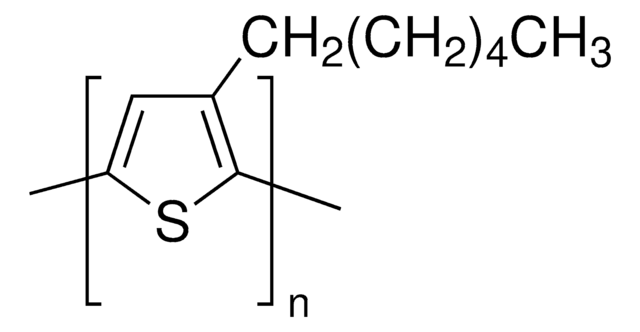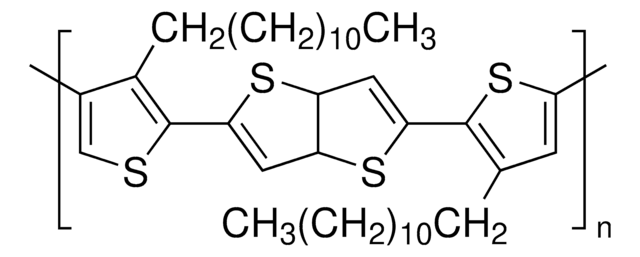754005
PCPDTBT
average Mw 7,000-20,000
Synonyme(s) :
Poly[2,6-(4,4-bis-(2-ethylhexyl)-4H-cyclopenta [2,1-b;3,4-b′]dithiophene)-alt-4,7(2,1,3-benzothiadiazole)]
About This Item
Produits recommandés
Description
Band gap: 1.75 eV
Niveau de qualité
Forme
solid
Poids mol.
average Mw 7,000-20,000
Perte
0.5 wt. % TGA, 350 °C
Pf
>400 °C
λmax
700 nm
Énergie orbitale
HOMO -5.3 eV
LUMO -3.55 eV
Performance des dispositifs OPV
ITO/PEDOT:PSS/PCPDTBT:PC61BM/Al
Propriétés du semi-conducteur
P-type (mobility=2×10−2 cm2/V·s)
Vous recherchez des produits similaires ? Visite Guide de comparaison des produits
Catégories apparentées
Description générale
Application
Code de la classe de stockage
11 - Combustible Solids
Classe de danger pour l'eau (WGK)
WGK 3
Point d'éclair (°F)
Not applicable
Point d'éclair (°C)
Not applicable
Certificats d'analyse (COA)
Recherchez un Certificats d'analyse (COA) en saisissant le numéro de lot du produit. Les numéros de lot figurent sur l'étiquette du produit après les mots "Lot" ou "Batch".
Déjà en possession de ce produit ?
Retrouvez la documentation relative aux produits que vous avez récemment achetés dans la Bibliothèque de documents.
Articles
The development of high-performance conjugated organic molecules and polymers has received widespread attention in industrial and academic research.
Optoelectronic devices such as light-emitting diodes (LEDs), solar cells, and light-emitting field effect transistors (FETs) that utilize organic materials as their light harvesting and/or charge transporting component have been the subject of much academic and commercial attention.
Organic photovoltaics (OPVs) represent a low-cost, lightweight, and scalable alternative to conventional solar cells. While significant progress has been made in the development of conventional bulk heterojunction cells, new approaches are required to achieve the performance and stability necessary to enable commercially successful OPVs.
There is widespread demand for thin, lightweight, and flexible electronic devices such as displays, sensors, actuators, and radio-frequency identification tags (RFIDs). Flexibility is necessary for scalability, portability, and mechanical robustness.
Notre équipe de scientifiques dispose d'une expérience dans tous les secteurs de la recherche, notamment en sciences de la vie, science des matériaux, synthèse chimique, chromatographie, analyse et dans de nombreux autres domaines..
Contacter notre Service technique






![Poly[2-methoxy-5-(2-ethylhexyloxy)-1,4-phenylenevinylene] average Mn 40,000-70,000](/deepweb/assets/sigmaaldrich/product/structures/344/488/b8f8179d-3970-4deb-a754-adda88cdb36f/640/b8f8179d-3970-4deb-a754-adda88cdb36f.png)